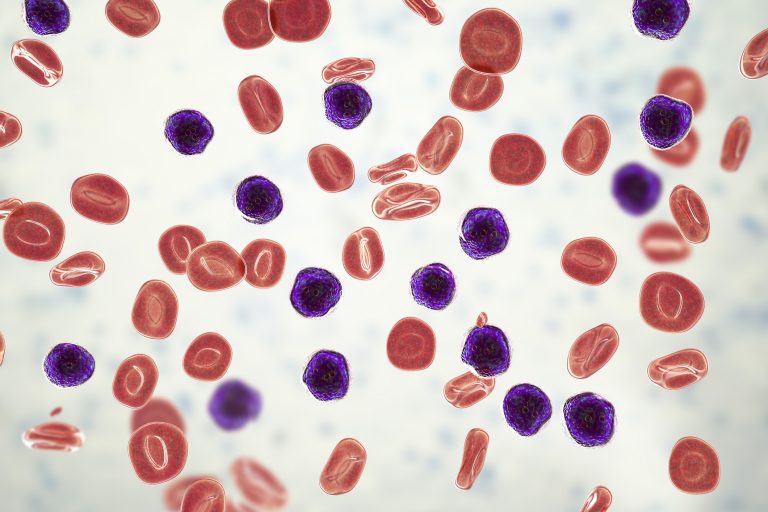
Studies led by researchers at NYU Langone Health, its Department of Pathology, and the Laura and Isaac Perlmutter Cancer Center, have found that the amino acid valine, which is a molecular building block in many animal proteins, plays a key role in T cell acute lymphoblastic leukemia (T-ALL) pathogenesis.
The in vitro and in vivo research, reported in Nature, showed that genes involved in using up valine in cells were more active in cancerous T cells than in normal T cells. Blocking these valine-linked genes not only led to decreased valine in leukemia blood T cells, but also stalled these tumor cells from growing in the lab. Only 2% of cancerous T cells remained survived the gene inhibition. Further, experiments suggested that mutations in NOTCH1, a key oncogene in T-ALL, encourage cancer growth in part by increasing valine levels. In vivo tests confirmed that limiting valine bioavailability through restriction of dietary valine intake led to decreased leukemic burden and increased survival in vivo.
“Our study confirms that T cell acute lymphoblastic leukemia is absolutely dependent on a supply of valine and that valine deficiency can stall this cancer’s progression,” said research co-lead Palaniraja Thandapani, PhD, a postdoctoral fellow at NYU Grossman School of Medicine and its Perlmutter Cancer Center. Thandapani and colleagues reported on their findings in a paper titled, “Valine tRNA levels and availability regulates complex I assembly in leukemia.”
Accumulating evidence suggests that reprogramming mRNA translation can drive protumorigenic programs, the team explained. “Translation initiation, the first and often the rate-limiting step in mRNA translation is commonly hijacked by oncogenic signaling pathways. However, recent findings have highlighted altered tRNA biogenesis and resultant changes in codon usage as an additional regulatory layer in the translation of cancer genomes.”
To see whether tRNA biogenesis might be deregulated in blood cancers, the team focused on T-ALL, a form of leukemia that affects children and adults, and for which there is currently no FDA-approved targeted therapy. The American Cancer Society estimates that more than 1,500 people in the U.S., mostly children, die each year from T cell acute lymphoblastic leukemia, and another 5,000 people will be newly diagnosed, NYU Langone Health noted. This type of cancer accounts for roughly a quarter of all leukemias.
The scientists’ analysis of gene expression datasets of primary T-ALL samples, and mature T cell subsets (as controls), found significant expression changes in T-ALL samples among genes involved in tRNA biogenesis. They then carried out a series of in vitro and in vivo studies, including experiments in mice with human leukemia cell transplants. The results of these in vivo studies showed that tumor growth was interrupted in leukemic mice fed low valine diets for three weeks. Valine is an essential amino acid that must be obtained through the diet. The experiments showed that a low-valine also led to circulating blood cancer cells that were reduced by at least half, and in some cases to undetectable levels. By contrast, re-introduction of valine to the diets led to cancer progression.
“… our data reveal upregulated valine tRNA biogenesis as an indicator of increased demand for valine in protein synthesis in T-ALL. In addition, a direct link for NOTCH1 signaling in upregulating valine tRNA biogenesis underscores a role for oncogenic transcriptional programs in coordinating tRNA supply with increased demands in protein production,” the investigators wrote. “Moreover, we show that this dependency can be targeted by restriction of dietary intake of valine in preclinical T-ALL mouse and human xenograft models.”
The research team has plans next year to test whether diets low in valine-rich foods, such as meat, fish, and beans, are an effective treatment in people with the cancer. Low-valine diets are readily available, Thandapani says, as they are already being used to treat acid imbalances in the body tied to genetic disorders that affect gut metabolism. “Valine dietary manipulation is clinically used in the management of metabolic diseases, such as propionic and methylmalonic acidaemias, and may effectively synergize with targeted therapies in the treatment of human T-ALL,” the scientists pointed out.
Senior study investigator Iannis Aifantis, PhD, says the trial design would likely combine diet therapy with venetoclax, a drug already approved for use in the US for most other types of leukemia. Drug combination is important, he says, because such dietary restrictions are not likely sustainable in the long term. This is due to the known potential for muscle wasting and brain damage from prolonged valine deficiency. “… a genome-wide loss-of-function CRISPR–Cas9 screen under different valine conditions identified novel targets for potential combination therapies with controlled dietary valine restriction that can enhance the potential of using dietary valine restriction as a therapeutic option,” the team noted.
“Our clinical approach would involve using low-valine diets to shrink the number of T cells with acute lymphoblastic leukemia to a level so low that drugs could then effectively stall cancer progression,” said Aifantis, the Hermann M. Biggs Professor and chair of the Department of Pathology at NYU Grossman and Perlmutter. Encouragingly, the reported studies in mice also indicated that controlled dietary valine restriction could delay the progression of leukemia without the adverse effects of total valine deprivation.
Aifantis says many basic cell building blocks, including proteins, nucleotides, and fatty acids, are needed for cancer to grow and spread. At least half a dozen other amino acids, especially high levels of lysine, have been implicated in cancers, but their precise roles remain unknown. He cautions that dietary strategies alone for treating cancer have been tried for decades with little scientific evidence of any benefit. He says more research is needed, including the team’s planned clinical trial, before any treatment guidelines can be recommended.
Aifantis is a consultant for Foresite Labs, a healthcare investment firm based in San Francisco that has financial interests in the development of leukemia therapies. Study co-investigator Aristotelis Tsirigos, PhD, serves as a scientific advisor to Intelligencia.AI in New York City, a software company that applies machine learning to cancer drug development.











